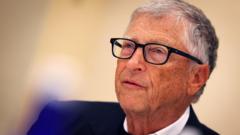In a bold move aimed at curtailing unnecessary government expenditure, the Department of Government Efficiency (DOGE) has announced a sweeping $51 million cut from the U.S. African Development Foundation, bringing significant attention to spending deemed frivolous on niche marketing initiatives and agricultural programs overseas.
Cuts to African Development Programs Spark Controversy

Cuts to African Development Programs Spark Controversy
The DOGE reveals significant reductions to foreign aid projects, citing wasteful spending during economic hardship at home.
DOGE highlighted several high-profile expenses that raised eyebrows, including $229,296 allocated for marketing organic shea butter in Burkina Faso and $246,217 for establishing mango drying facilities in the Ivory Coast. Other expenditures included $239,738 for the promotion of pineapple juice in Benin, $99,566 aimed at boosting yogurt production in Uganda, and $84,059 for creating a spa and wellness business incubator in Nigeria. The list continues with $50,000 designated for training farmers in Senegal to cultivate dragon fruit, alongside $48,406 invested in a WhatsApp marketing chatbot in Kenya.
Despite claims from the U.S. African Development Foundation that these programs fostered economic growth, DOGE has asserted that taxpayer funds should not support niche markets abroad, particularly while many Americans grapple with inflation and economic instability.
This measure aligns with DOGE's larger initiative—championed by entrepreneur Elon Musk during the Trump administration—to eliminate $1 trillion in wasteful federal spending. The aim is to reallocate these resources towards more pressing national priorities, reflecting a significant change in approach to international aid and spending efficiency.
Despite claims from the U.S. African Development Foundation that these programs fostered economic growth, DOGE has asserted that taxpayer funds should not support niche markets abroad, particularly while many Americans grapple with inflation and economic instability.
This measure aligns with DOGE's larger initiative—championed by entrepreneur Elon Musk during the Trump administration—to eliminate $1 trillion in wasteful federal spending. The aim is to reallocate these resources towards more pressing national priorities, reflecting a significant change in approach to international aid and spending efficiency.



















